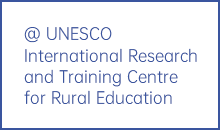On 15-16 December 2022, “China-Southeast Asian Symposium Towards Ecological Civilisation: Education for Sustainable Rural Development” was successfully held online. This event is supported by the National Commission of the People’s Republic at China for UNESCO, hosted by Beijing Normal University(BNU), and organised by The UNESCO International Research and Training Centre for Rural Education(UNESCO INRULED), Faculty of Education at Beijing Normal University, China Zigen Rural Education and Development Association Rural Education and Development Association, Southeast Asian Ministers of Education Organization(SEAMEO) and Asian Institute of Technology(AIT). The overarching theme is “education for sustainable rural development towards ecological civilisation”, and three sub-themes are “Policy and Practice”, “University and Local Actions”, and “Towards a Sustainable Future: Youth on the Move”. More than 400 scholars, youth representatives, university teachers and students, and NGOs delegates from more than ten countries, including China, Laos, Thailand, the Philippines, Cambodia, Malaysia and Indonesia, attended the symposium virtually, sharing their experiences and lessons learned in education for sustainable rural development, as well as their reflections on the challenges and prospects of building ecological civilisation. Meanwhile, over 1,000 audiences participated in this event via live streaming.
The opening session was chaired by ZHU Xudong, Dean of the Faculty of Education, Beijing Normal University. Prof. ZHOU Zuoyu, Vice President of Beijing Normal University, Dr. Ethel Agnes Pascua-Valenzuela, Director of the Secretariat of Southeast Asian Ministers of Education Organisation, Dr. YAO Jun, Vice President of China Zigen Rural Education and Development Association, and Mr. QIN Changwei, Secretary-General of National Commission of the People’s Republic of China for UNESCO, delivered opening remarks.
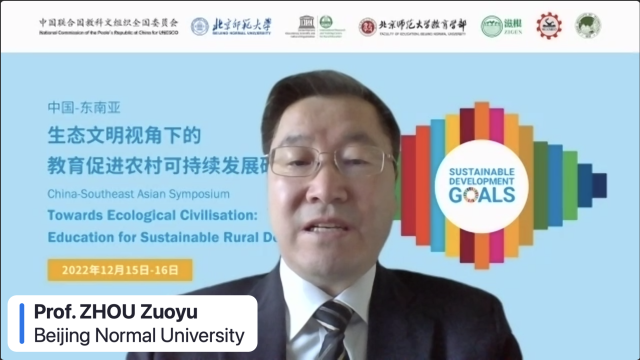
Prof. ZHOU Zuoyu extended a warm welcome to all speakers and participants. He then addressed that the promotion of ecological civilisation concerns the global common good and a sustainable future, and building a human community with a shared future. He hoped that this symposium would consolidate relations between China and Southeast Asian countries, providing a platform for knowledge exchange and practical experience sharing on education for sustainable development, and contributing to achieving global sustainable development goals.
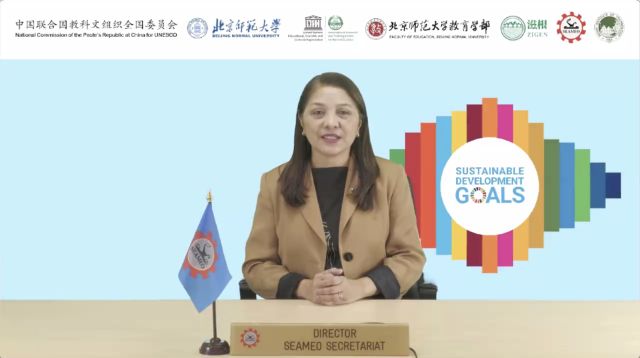
Dr. Ethel Agnes Pascua-Valenzuela suggested that countries in Southeast Asia should recognise the importance of education in promoting sustainable development and strengthening international cooperation and exchanges. She further noted the need to promote capacity building for youth through a more resilient education system, and to build partnerships across Southeast Asia to advance the SDGs.
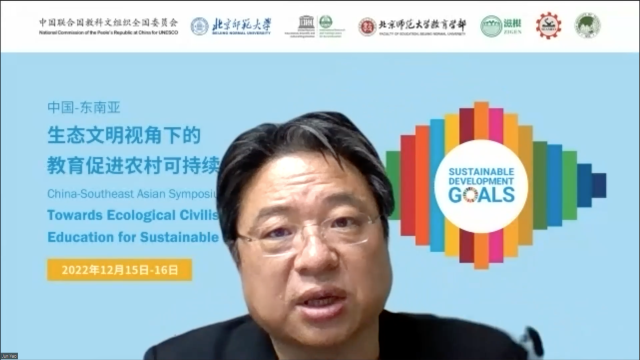
Dr. YAO Jun stressed in his speech that education for sustainable rural development is a forward-looking, comprehensive and systematic project that answers both domestic and international concerns. The sustainable development goal cannot be achieved overnight, he hoped that countries would work together to build a network for cooperation, research and practice.
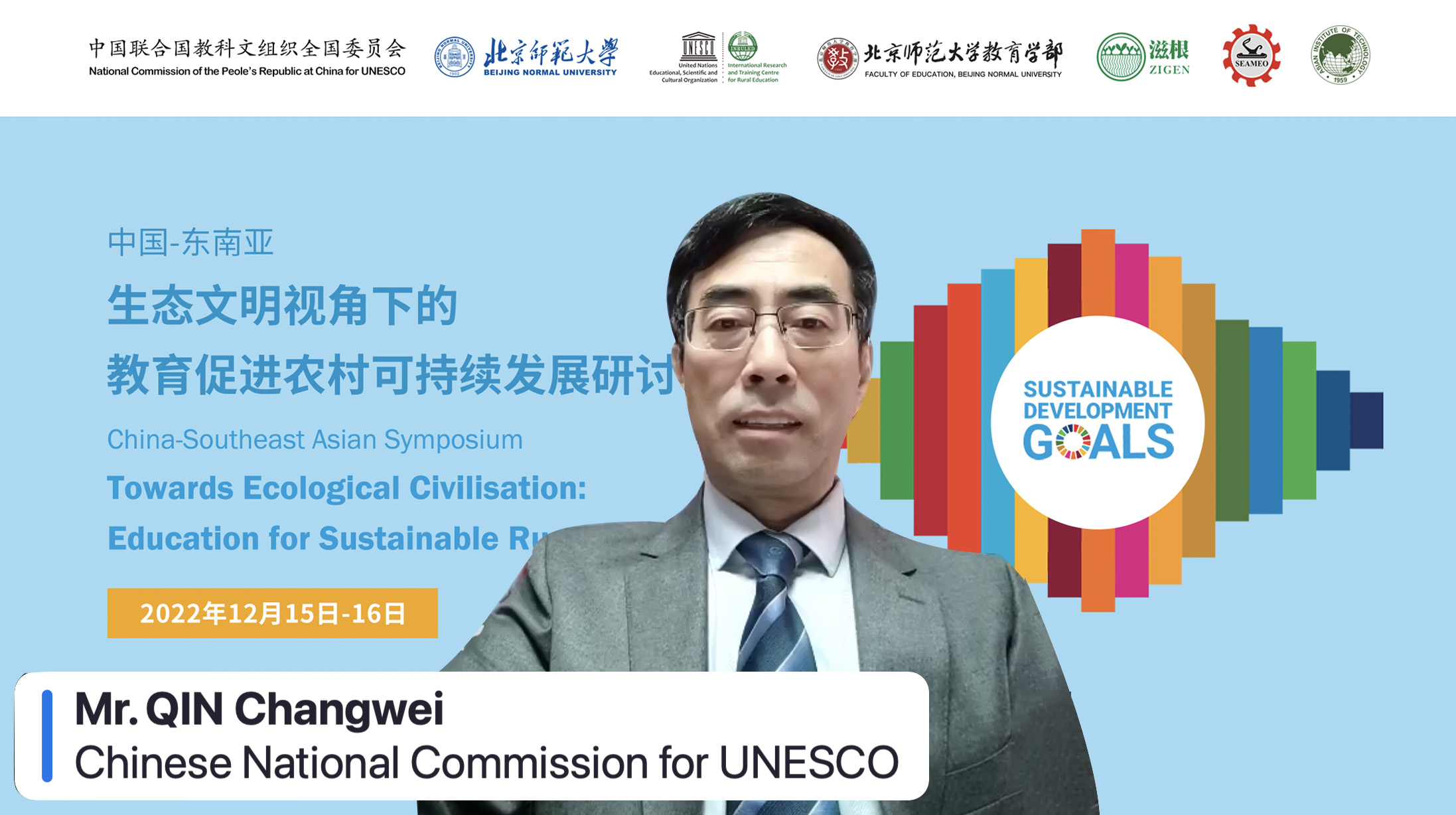
Mr. QIN Changwei highlighted the focus of this symposium: the practice and innovation in education for sustainable development, which is of great significance in the educational cooperation between China and Southeast Asia. He stated that the world is currently facing severe challenges caused by climate crisis and environmental degradation, hence, building ecological civilisation is an intrinsic path toward sustainable development. This era urgently requires us to study, research and advance the agenda of sustainable rural development from different dimensions to realise ecological civilisation.
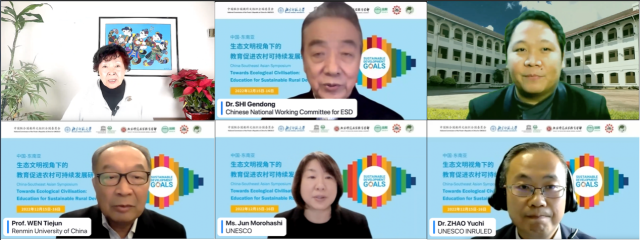
The keynote speech session was moderated by Dr ZHAO Yuchi, Deputy Director of UNESCO INRULED. Prof. WEN Tiejun, School of Agricultural Economics and Rural Development at Renmin University of China, Ms. Jun Morohashi, Chief of the Section of Education for Sustainable Development at UNESCO, Prof. Bert Tuga, President of Philippine Normal University, Ms. YANG Guiping, Founder of China Zigen Rural Education and Development Association, and Dr. SHI Gendong, Executive Director of China National Working Committee for UNESCO on Education for Sustainable Development, delivered speeches. Based on their respective fields of expertise, the speakers gave in-depth analyses of the concept and core values of “ecological civilisation” and “rural revitalisation”. They also explored the education pathway for sustainable rural development in China, summarised global lessons and local wisdom on Education 2030 in rural areas, shared experiences, and provided suggestions on education for sustainable rural development.
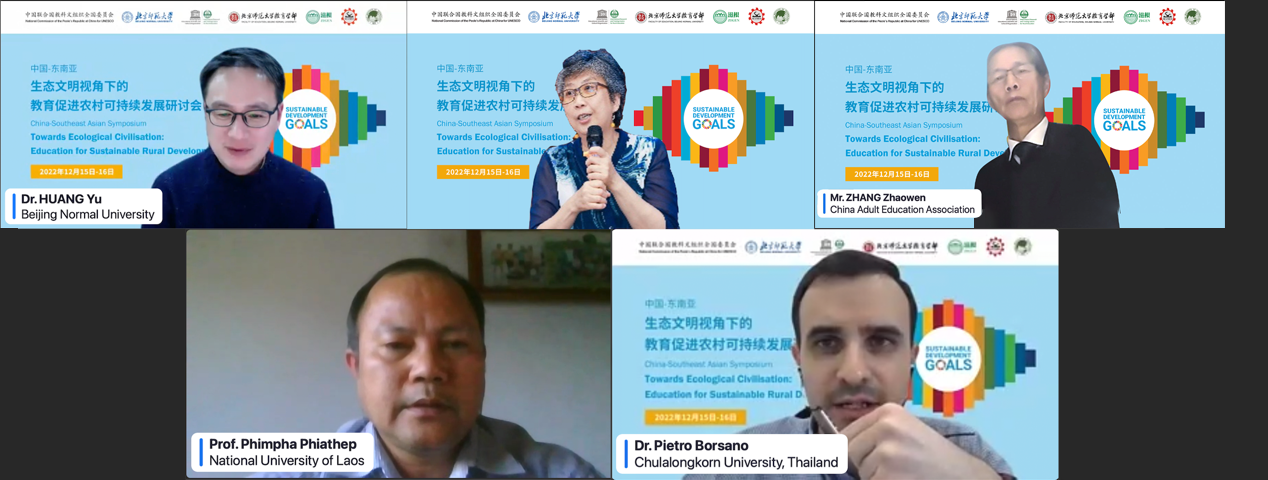
Session 1, “Policy and Practice” was moderated by Dr HUANG Yu, Associate Professor of the Institute of International and Comparative Education at Beijing Normal University. Dr. Pietro Borsano, Deputy Executive Director and Senior Lecturer in the School of Integrated Innovation at Chulalongkorn University, Thailand, Prof. HAN Jialing, visiting professor of the Institute of Economics and Social Sciences at Jinan University, Prof. Glenn B Gregorio, Director of SEAMEO Regional Centre for Graduate Study and Research in Agriculture, Prof. Phiathep Phimpha, Head of Department of Pedagogy Social Science at the National University of Laos, and Mr. ZHANG Zhaowen, Former Vice President of China Adult Education Association, gave presentations in turn. From perspectives of socio-economy, culture, technology, environment and education, speakers discussed the opportunities and challenges faced by rural areas in the current trend of digital economy, and elaborated on the approaches in TVET, community education and elderly education for capacity building and talent training to promote rural development. They further argued that sustainable rural development does not solely rely on science and technology, it should also incorporate the education of indigenous culture, environment and lifelong learning.
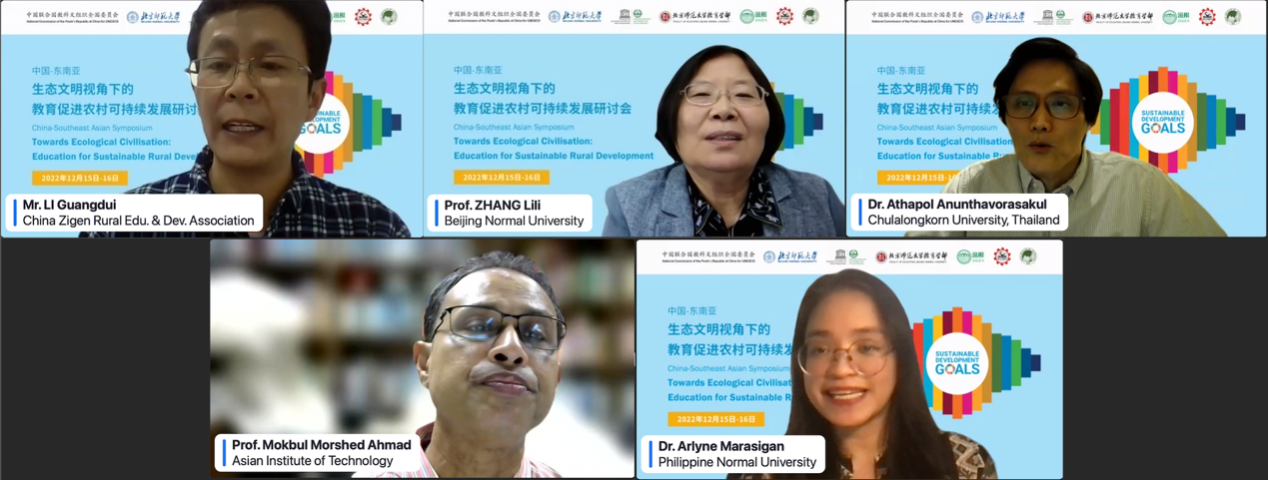
Session 2, “University and Local Actions” was moderated by ZHAN Lili, Professor at the Faculty of Education at Beijing Normal University. Mr. LI Guangdui, Expert of ESD programmes of China Zigen Rural Education and Development Association, Dr. Athapol Anunthavorasakul, Director of ESD Centre in the Division of Curriculum and Instruction at Chulalongkorn University, Thailand, Prof. Mokbul Morshed Ahmad, Head of Development Planning Management and Innovation (DPMI) at Asian Institute of Technology, and Dr. Arlyne Marasigan, Assistant professor at Philippine Normal University, delivered speeches on the role of universities in promoting sustainable rural development. They noted that understanding how rural schools participate in sustainable development and bridging the gap between universities and small-scale schools is a long-term process that requires sustainable systems for quality education and long-standing university-local partnerships.
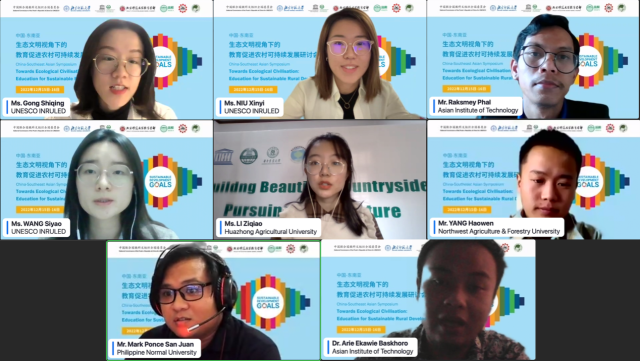
Session 3, “Towards a Sustainable Future: Youth on the Move” was moderated by Ms. WANG Siyao, Programme Assistant of UNESCO INRULED. In this session, Ms. GONG Shiqing, Programme Assistant of UNESCO INRULED, shared key findings from the report Youth Participation in Sustainable Rural Development: Strategy, Role and Impact of ESD programmes. Afterwards, Ms. LI Ziqiao, from Huazhong Agricultural University, Mr. YANG Haowen, from Northwest Agriculture & Forestry University, Dr. Arie Ekawie Baskhoro and Mr. Raksmey Phal from Asian Institute of Technology, and Mr. Mark Ponce San Juan, from Philippine Normal University shared their efforts in bird conservation, digital hive, environmental protection, agricultural development and student leadership. They also analysed the constraints on human resources and funding that youth initiatives face today. Together, they shared that education is important for all aspects of social development, particularly for agriculture and the environment, and that the advancement of education itself requires the involvement of multi-stakeholders. They emphasised that young people, with their creative thinking and capacity for action, have the potential to contribute more to a sustainable future.
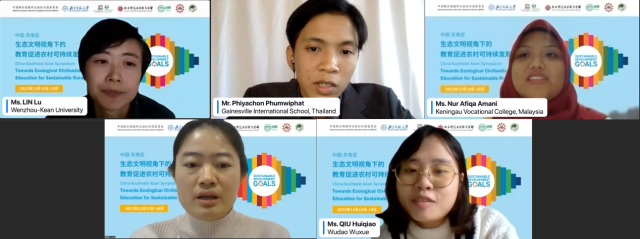
The Youth Roundtable part was facilitated by Ms. ZHANG Silu, Secretary-General of China Youth Climate Action Network, with the participation of Ms. Nur Afiqa Amani, from Keningau Vocational College, Malaysia, Mr. Phiyachon Phumwiphat, from Gainesville International School, Thailand, Ms. Lin Lu, Lecturer of Wenzhou-Kean University and Ms. QIU Huiqiao, CEO of Wudao Wuxue Education for Sustainable Development. As youth leaders, they dived into questions regarding youth mobilisation in rural development, innovative technologies for sustainability challenges, and fostering global citizenship awareness. From their own practical experiences, they shared insights on topics such as behaviour change, intergenerational communication, intellectual experience, public service, competition modes and social equity.
In the last part of Session 3, UNESCO INRULED and its partners launched A Call to Youth-led Actions: Promoting Sustainable Rural Development Towards Ecological Civilisation. With “youth-led actions”, “sustainable rural development ” and “ecological civilisation” as the three keywords, the Call further identifies four priority areas for action, namely, environmental protection, cultural preservation, equity and inclusion, and technology and innovation. It calls on more youth participation and youth-led actions in the movement for sustainable rural development, and also calls for joint efforts from the education sector.
After two days of in-depth discussions, delegates and participants from different organisations have deepened their understanding of ecological civilisation and education for sustainable rural development. The exchange of practices and experiences, and the initiative on youth-led actions in education for sustainable rural development, laid a solid foundation for future cooperation and exchanges between China and Southeast Asian countries.










